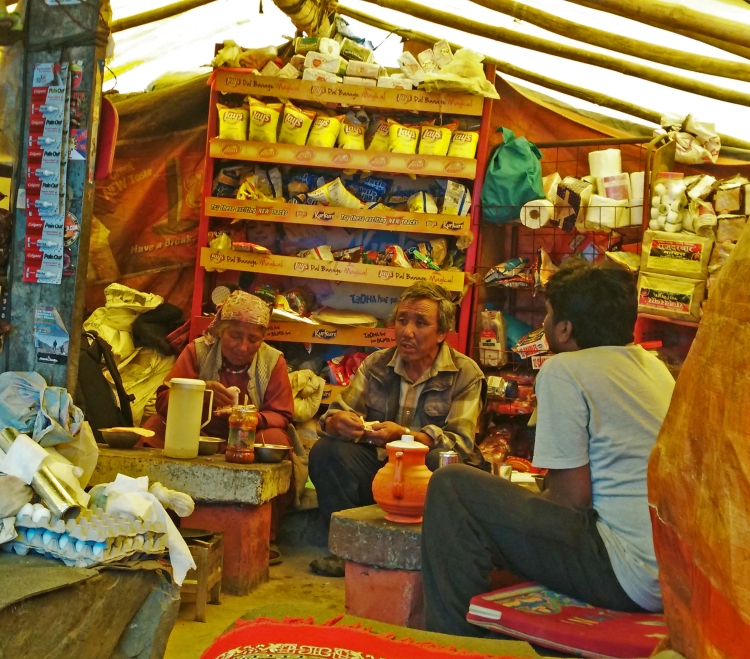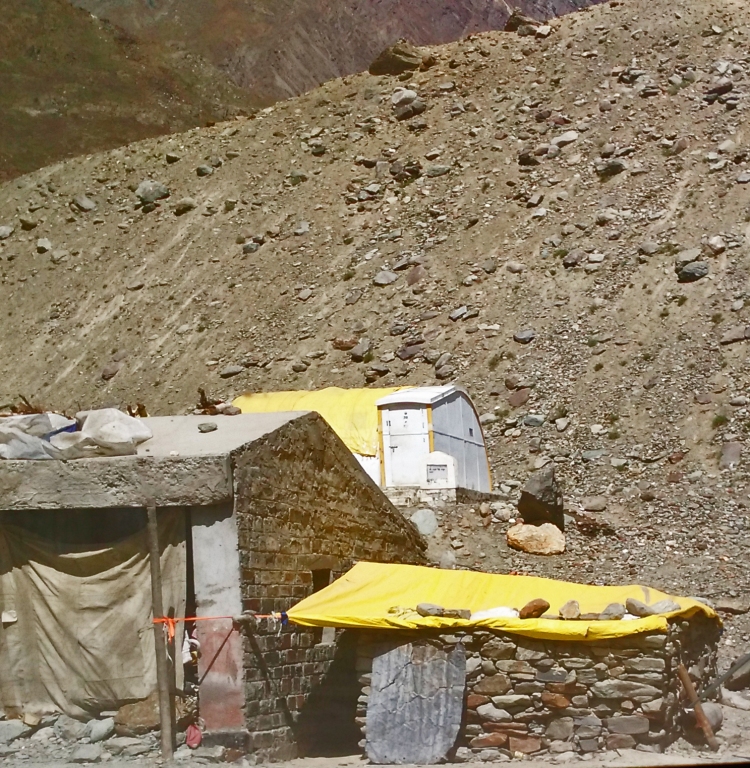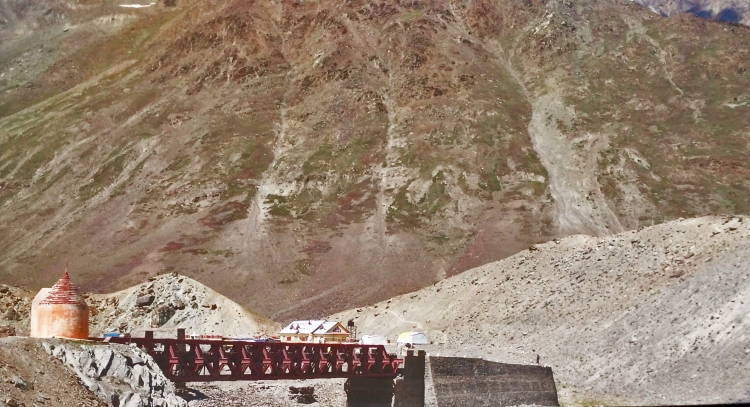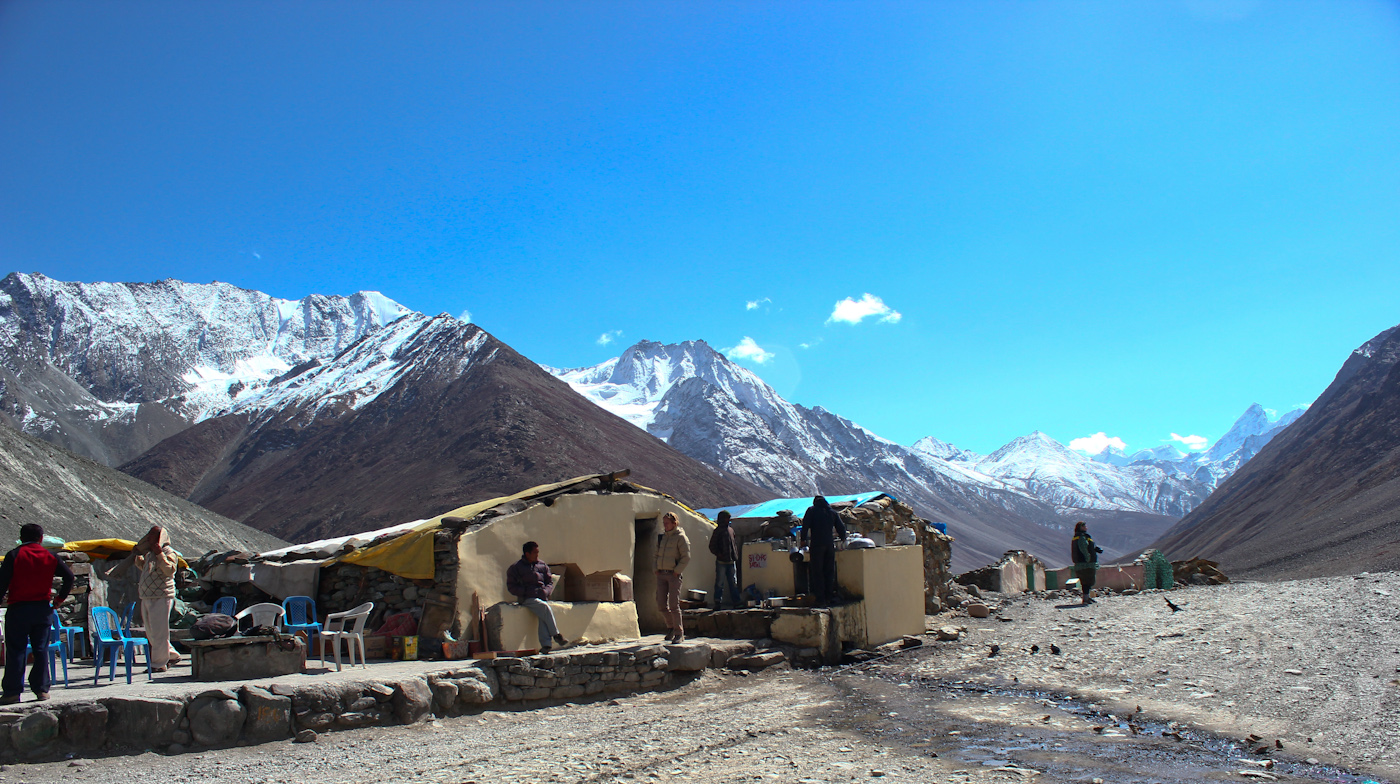I refuse to budge from this chair I have found. My butt deserves stability. I would have also liked some peace of mind but this damned crazy wind won’t let me have any of it. The best way to enjoy your time in Batal is to sit here on this platform to the left of the Chandra Dhaba with your eyes closed. This way you won’t have to constantly cringe up your face muscles to protect the soft gooeyness of your eyes against the wind.
A non-place. That’s what this is. Acres and acres of emptiness with the sudden interruption of a couple of encampments and a PWD guesthouse (one that sticks out like sore thumb in its concrete completion). This along with a steady population of five to six people. There you have it – Batal in its entirety. Welcome.
But once that rickety green and white leaves with all its well fed passengers, clattering over the red metal bridge, the hills grow on you from all eight sides. The wind presses a bit harder and one must climb down that one step and stoop into the dhaba.
It’s a cozier world indoors. The first thing I notice is peace of ears and immediately like the shelter. And then as my eyes adjust to the dim yellow light that seeps in through the rainbow coloured layers of plastic sheets on the roof, I spot the familial figures of chacha and chachi. Chacha behind the stove, slightly hazy with the waft of mist that arises from the kettle. And his beloved Chomo (pronounced with an s) just settled down to rest her knees after dealing with the afternoon customers.

Each year Chacha and Chachi make their way to Batal from a village 5 km below Manali to hack away the snow that covers their dhaba around April. I had read of them. More than 40 years of cooking and catering to ‘serious travellers’ who make their way to Kaza and beyond. Serious travelling is what they do. It takes them 9 days or so to uncover their shack from all the snow, says Chachiji as she puffs rotis at the back of the Dhaba partially hidden in the darkness. Tomorrow I will know that one shouldn’t always believe everything they are told.
Chacha with his wrinkle folded skin is a straight faced bugger who loves to mishear you.
“Ek chai.”
“Kya? Ath chai?”
“Chacha rehne ka kar do theek daam mein.”
“Theek daam… Hazar? Do hazar?”
“Aapke lie nai chacha, mere lie.”
Chachi is aptly irked with him. They have their tiffs in the local language at the back of the dhaba. You can make out the dissatisfaction in her voice by the grunts. Chacha is late in serving dinner and not proactive enough to ask new guests what they want. Chachi near the stove at the back keeps a tab on all that’s not going according to plan.
Chacha reminds me of Puneet. Always working. Giving out instructions to chhotu (the cheeky Nepali in their service) on how to clean the shelf better. A joke always on his lips.
“Chachaji 4 chai ka kitna hua?”
“400 dedo.”
Indian traveller, shocked but pretending otherwise, starts pulling out the money when Chachaji intervenes. “Arey 40, bhai.”

I have cooped up in a square stone shack with two layers of plastic sheets for roof. Yellow and orange. This room can accommodate up to four people. The narrow entrance guarded by a broken sheet of tin opens up to a low floor stones slab on the right with four mattresses placed vertically one after the other. This then is covered with an off-white sheet. At the foot of the bed, is another stone slab (a continuation of the bed) that is used for storing an army of blankets all unique in their effectiveness to tackle the cold.
Later in the evening, I’m joined by Roe and Adi from Israel. They are both 21 years old and have just finished their army stint. In the evening we have a long chat about all kinds of things. About their lives back home, about the country they belong to, about the country they are travelling to and more. They are thrilled to see I scribble in English. They can’t believe it and keep repeating it to each other for some time. They tell me how English is damn important in Israel too. They even tell me that they not in India just for the hashish. In fact, they don’t quite approve of those who come to such a beautiful place just for the drugs.
The three of us are being charged Rs. 200 each for one mattress in the stone shack. Plus there’s dal, chawal, rajma and aloo beans sabzi for dinner. God’s food. Warm and steaming. But I’ll stay long enough to hate the menu and even discover the box of meat that’s strategically stored above the shelf and secretly wish I could eat some of that. Mmm mutton. Even though I’m not to be lucky with that but at least I have the eye to spot some chhang to drown my sorrows.
The stoney roughness here is too overwhelming at times for a plains person like me with maach bhaat on my table and a profusion of shorshe tel, pantua and other belly sagging delicacies.
Life here doesn’t give you a belly. It gives you wrinkles. A roof of plastic sheets is a priviledge here. Taking a bath in the PWD guest house in its freezing water is a priviledge here. Knowing that a somewhat clean washroom lies safely behind locked doors in close vicinity is a priviledge. Electricity would be but there is none. Just one dim solar light in Chandra Dhaba and a flickering candle in my cave.

***
The sparrows here are marked like the lose rocks that dot the hills around. Frail little things.
The crows here, black as can be with yellow beaks, don’t really fly. They float. The wild wind won’t allow them to flap their wings.
Moths in plains or the hills, plain does or furry ones are united by their love for the candle. As I write, two descended to suicide. But they seemed to have changed their minds and are just squatting on the floor now. Next to my bag.

